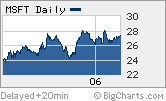|
Microsoft's big Internet bet -- will it pay?
The company is developing all-new Internet tools to compete with rivals Google and Yahoo!
NEW YORK (CNNMoney.com) - Microsoft is the clear leader in operating systems and office software but when it comes to the Internet, the company is way behind rivals Google and Yahoo! But Microsoft (Research) doesn't like being second, let alone third in the markets it plays in -- which is why the company is making big moves to revitalize its Web strategy.
Last fall, the company introduced the Windows Live platform, which pulls together tools such as search, Web mail and news headlines onto a single Web site, Live.com. Since then it has been rolling out new tools on that platform that aim to compete with offerings from Google (up $7.21 to $347.00, Research) and Yahoo! (up $0.53 to $30.60, Research) And Monday it's launching a three-day conference for developers to talk about how to develop technologies for the Web. Microsoft has come from behind to crush rivals before when it comes to online services. One obvious example: Way back when, it lagged far behind Netscape in the browser market but it eventually crushed Netscape with its now nearly ubiquitous Internet Explorer Web browser. Given the company's huge cash reserves and historical distaste for second place, it's clear that Microsoft is going to make aggressive moves to catch up with its competitors. But when it comes to search, is it possible the company is just too far behind its rivals? As of January, Google had 48.2 percent of the Internet search market and Yahoo! commanded a 22.2 percent share, according to Nielsen/NetRatings. MSN Search, by contrast, had 11 percent, and that was down 1.8 percentage points from a year earlier. "Their prospects for the near term are very rough because they have not been able to attract the talent Google and Yahoo! have," said Richard Doherty of the market research firm Envisioneering Group. "That's not to say they won't, whether through acquisitions or a new bonus program. But they came so late to Live that their rivals had hired many of the top people." A home court advantage
But some analysts, Doherty among them, say that while Microsoft may not make huge gains overnight, its rivals shouldn't get too comfortable. "Microsoft has entered as a full-fledged competitor," said Rob Enderle, who founded the technology-focused market research firm Enderle Group. "The (Windows Live) search product looks to be more advanced by a generation, and we're going to have a leapfrog competition as the two firms try to out do each other," he said of Microsoft and Google. In addition, Microsoft's new Web-based initiatives are well-timed to coincide with its launch of some key new products, such as its new computer operating system, Windows Vista, and the new suite of Office 12 software products, some analysts said. Both Vista and Office 12 are due later this year, and Microsoft wants to tie them with its new Web-based products. Microsoft also announced Office Live, which is meant to help small companies do business online. Michael Gartenberg, vice president and research director at Jupiter Research, said in the past, rivals such as Google and Yahoo! have tried to gain a foothold on the Windows desktop with tools such as the Google toolbar that lets users search Google straight from their desktops, without having to open a browser window and go to Google.com. "A lot of those technologies will be leveraged into the next version of Windows, which will give Microsoft a home court advantage," said Gartenberg, adding it will also give Microsoft a chance to create a seamless experience for users, allowing them to use Web-based technologies through their desktops. "What Microsoft is trying to do in terms of the evolution of the Web is not to try and ignore it, nor is it trying to own it, but to make sure they are participating in a high-quality way and that their tools all leverage back to the desktop," he said. "What we're trying to do is create a seamless set of services to help connect people," said Brooke Richardson, MSN Group Product Manager for Microsoft. "People think about applications when they think about talking to someone -- what we are trying to do is turn things around and make them relationship-centric." This is precisely why the company is so focused on improving its offerings now. Windows Live launched last November but new services under the Live umbrella have been coming out at a fast clip ever since. Among the new tools: Windows Live Search, meant to make the site more competitive with Google's search engine, and Live.com, a customizable home page that lets users see the news they want and have headlines sent to their phones and mobile devices. Windows Live Mail, currently in beta testing, is the company's new free, desktop-based e-mail service and will eventually work with other Windows Live services, including messaging, to allow users to start voice or video conversations from one PC to another -- or from a PC to a phone -- directly from e-mail by right-clicking on their contacts. Old brands, new technologies
As part of that strategy, Microsoft kicked off its first ever MIX conference, which the company bills as a "72-hour conversation" between Web developers, Web designers and people who do business on the Internet. The point is for attendees to discuss how to build technologies that take advantage of the Web -- and of Microsoft's new operating system and Web browser, Windows Vista and the newest version of Internet Explorer. Meanwhile, the company's MSN page has evolved into a content site, rather than just a Web presence for getting Microsoft's Web-based tools, and those will eventually be rebranded under the Windows umbrella. Gartenberg of Jupiter Research said that in overhauling its Web strategy, Microsoft is going back to its core brand names -- Windows and Office -- which he thinks will serve the company well. "Microsoft is leveraging off its core strengths onto the Internet and making sure all those new technologies go back to those products that have been so successful for them in the past," he said. ---------------------- Site sues Google over search rankings: More here.
Is Microsoft wasting $500 million?Click here. |
|



